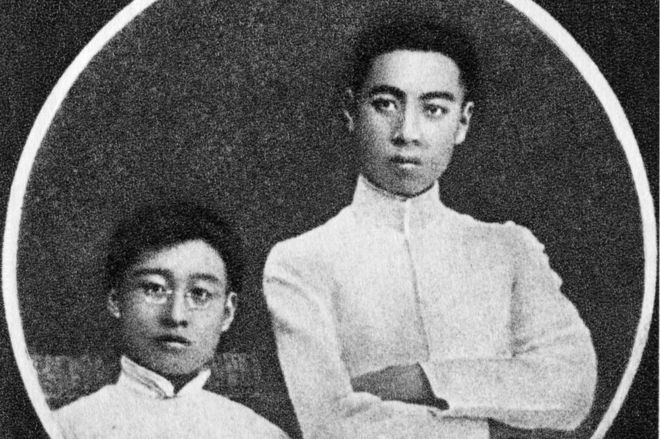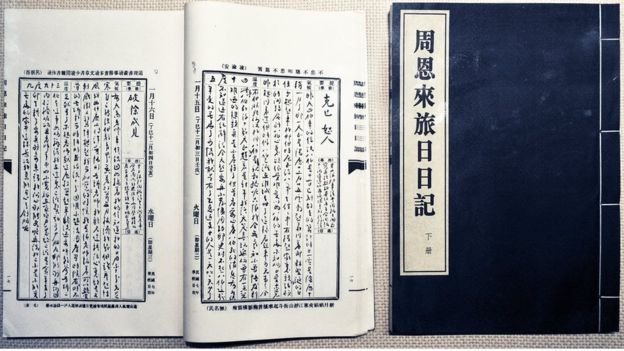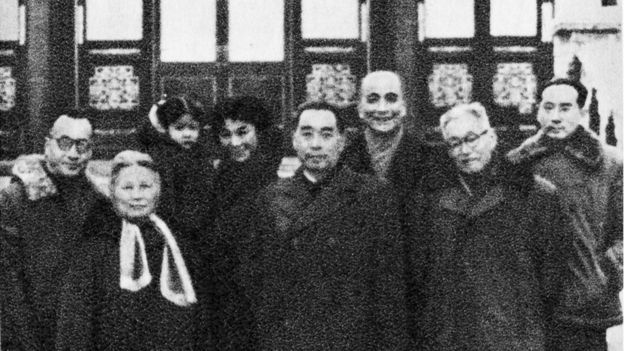By Juliana Liu Hong Kong correspondent, BBC News
Handsome and urbane, Zhou Enlai presented a modern, progressive face of China at home and abroad during more than 25 years as the country’s first premier.Like Mao Zedong, he was a colossal figure in the Communist Party.
Unlike Mao, he has survived multiple revisions of China’s tumultuous, often bloody history with his reputation largely intact.
And now, a new book, published in Hong Kong, reveals that he may have been hiding a secret that would shock many who are familiar with his official biography .
Tsoi Wing-mui, author of the Secret Emotional Life of Zhou Enlai, writes that the premier was gay, and harboured a lifelong love for Li Fujing, a family friend and classmate two years his junior.
“Zhou Enlai was a tragic figure,” she told BBC News. “He was very famous and always under the media spotlight. But there were many aspects of his life that were like riddles and difficult to explain.”
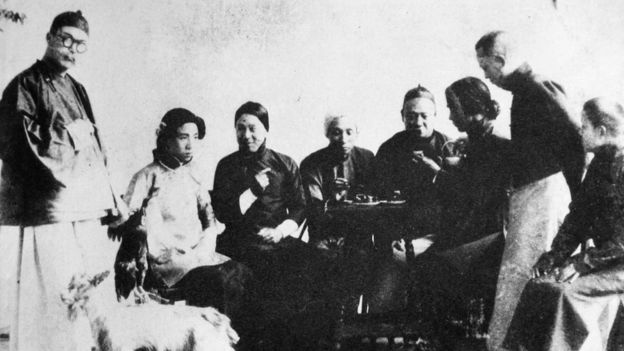
Zhou (second left) played a woman in this school play – something the author says he did often . New Century Press
The revelation of his sexual orientation, she believes, helps explain some of these mysteries, including a tepid marriage with his wife, Deng Yingchao, and why he suddenly joined the Communist Party in 1921 in France.
The book is being published in Hong Kong by New Century Press, the same house that printed the memoirs of Zhao Ziyang, the liberal premier purged in 1989 for siding with the pro-democracy protesters of Tiananmen Square.
The author expects the book will be banned in China, where some may regard her analysis of Zhou’s life as a smear campaign.

A life that shaped history
- Born into an upper-class family in 1898 in Jiangsu Province.
- In 1917, travelled to Japan, returning to China in the wake of Beijing student demonstrations known as the May Fourth Movement.
- After arrest in 1920, travelled to the UK and then France, where he joined the Communist Party, met many of its future leaders, and rose through its ranks, before returning to China in 1924.
- Helped organise the Nanchang Uprising against China’s Nationalists in 1927 – seen as the start of the Red Army.
- In 1949, after the Communist Party won the civil war, became China’s first premier (formally, Premier of the Government Affairs Council) and foreign minister.
- In the mid-1950s, initiated contact between China and the US.
- Survived the purges of the Cultural Revolution in the late 60s and early 70s, and tried to limit some of its worst excesses, while remaining loyal to Chairman Mao.
- Welcomed President Nixon to China in 1971, and signed the Shanghai Communique, which promised to normalise relations between the US and China.
- Died in January 1976 – the year the two countries formally normalised relations.

Gay sex is not illegal in China and attitudes towards sexual minorities vary enormously across the country. But gay marriage is not allowed, and mainland China has no openly gay politicians.
Many will regard Ms Tsoi’s thesis as highly speculative, and not backed up by rigorous archival research. They may also question what the significance of such a revelation is likely to be, how it might cast any meaningful light on the past. It is unlikely to be accepted as part of any official biography.
Ms Tsoi, the former editor of the liberal Open Magazine, says she spent three years researching the book, after being asked to investigate longstanding rumours that China’s much admired premier was gay.
Her most important source material was a diary, written by Zhou in 1918 when he was 19 and studying in Japan.
She says Zhou never expected anyone else to read the diary, but it was officially published, along with many of his letters and papers, in 1998, on the 100th anniversary of his birth.
“I start my diary today, and intend not to skip a single day,” according to the first entry, dated 1 January.
“For the first time in my life I have been touched by the word ‘love’. As for my innocent heart…”
What followed was dramatically blacked out by a swipe of his calligraphy brush.
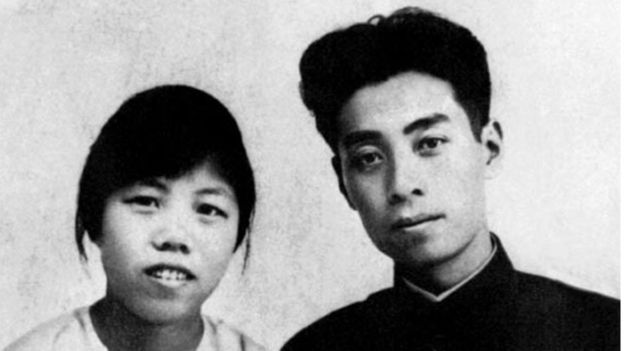
Zhou’s seemingly indifferent attitude towards his wife was taken as evidence of his devotion to the Party, at the time. New Century Press
According to Ms Tsoi, the dashing Zhou was already in love with Li, the 17 year-old son of a wealthy benefactor, who he had studied with at a prestigious, Western-style school in Tianjin.
During his years in the city, he also met Deng, an acquaintance who would one day be his wife.
But in 1918, says Ms Tsoi, Zhou’s main ambition was to get a place at university in Japan, and to convince his beloved to join him there.
According to his diary, by August, he was devastated to hear that Li had been accepted at the University of Hong Kong, and planned to move there.
“I felt a terrible pain in my heart, all my happiness suddenly turned to dust, and with a shock like cold water being poured down my back, I suddenly swooned,” he wrote in an entry dated 26 August.
“I was absolutely unable to put the matter into words. I drifted off yet was unable to stay asleep. I was miserable!”
Ms Tsoi says she was unable to uncover any evidence of a physical relationship between the two, or indeed written evidence of Li’s romantic feelings toward Zhou.
It is just one of many interpretations of the missing pieces of Zhou’s life – and she does not begin to address what it means to be gay.
But she believes the younger man cared greatly for him, as Li unexpectedly refused his place at university, opting to travel to Britain with Zhou, via France, in 1920.
Li was able to secure a place at the University of Manchester the following year.
Zhou, born to a genteel but penniless family, sought entry to the University of Edinburgh, but was unable to afford the fees.
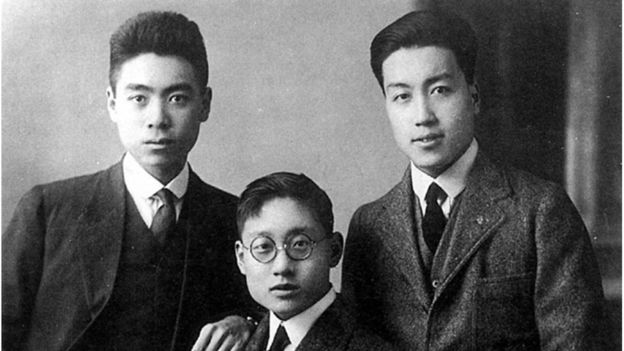
The young men (Zhou left, Li centre) went to the UK to study, but Zhou could not afford to stay. New Century Press
Broke, discouraged and heartbroken – according to the book – he gave up the idea of studying in Britain and returned to France, where it was cheaper to live.
After losing the chance to be with Li and needing financial support, the author says, Zhou was recruited into the Communist Party, to which he would famously and wholeheartedly dedicate the rest of his life.
Ms Tsoi, a Sichuan native who moved to Hong Kong in 1980, says she was frequently shocked by the revelations she was able to uncover from public sources.
“I am not a trained historian. I am just a journalist. I was so surprised that no-one else had seen what I was seeing,” she says. “At times, I really doubted myself.”
But after consulting a number of other sources, including Deng’s papers, she became convinced of her thesis.
Because Zhou died in 1976, almost 40 years ago, she does not believe her revelations will have any political fallout on the current leadership in Beijing. But she does think it may help a growing movement for the rights of sexual minorities in China.
XiaogangWei, a Beijing-based veteran activist for lesbian, gay, bisexual and transgender rights, agrees, telling BBC News that a book focusing on Zhou’s possible sexual orientation would be big news in his community.
“I welcome anything that would lead to further discussion of LGBT history, and our future. I think that’s really positive. Maybe we will never know for sure whether Premier Zhou was gay, but he was definitely a complex person with forward-thinking ideas about love and marriage,” he says.
Ms Tsoi says Zhou was a politician who was unfortunately born 100 years too early.
Steve Tsang, head of the School of Contemporary Chinese Studies at the University of Nottingham, agrees about the claims’ possible significance for the modern day.
“If true, this would be of significance for LGBT history in China and for the community today.”
But, while stressing he has not seen the book so does not know how credible it is, he makes a distinction for decades past.
“For general and political history this is not of great significance. There is no real basis to believe that Zhou would have conducted himself significantly differently, either as a revolutionary or as premier, whether he was gay or not.
“Any speculation that Zhou might have behaved the way he did to Mao Zedong as Zhou was gay, is just that – speculation – not backed by hard evidence.”
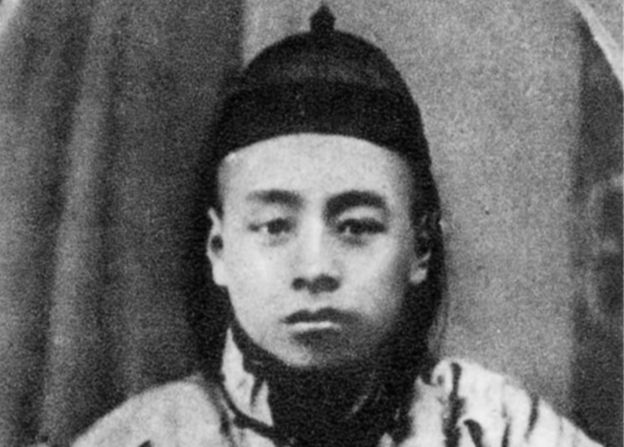
The author suggests a photo of Zhou as a boy was kept as a touching memento of lost love. New Century Press
As for Li Fujing, he later married and had several children.
But he and Zhou remained close all their lives, through all the ups and downs of the birth of modern China.
As proof, Ms Tsoi points to a photo of Zhou, taken in 1911 when he was only 13, and given to Li as a gift two years later.
She says that in 1958, the year the premier turned 60, Li gifted the photo back to Zhou, along with a warm inscription.

